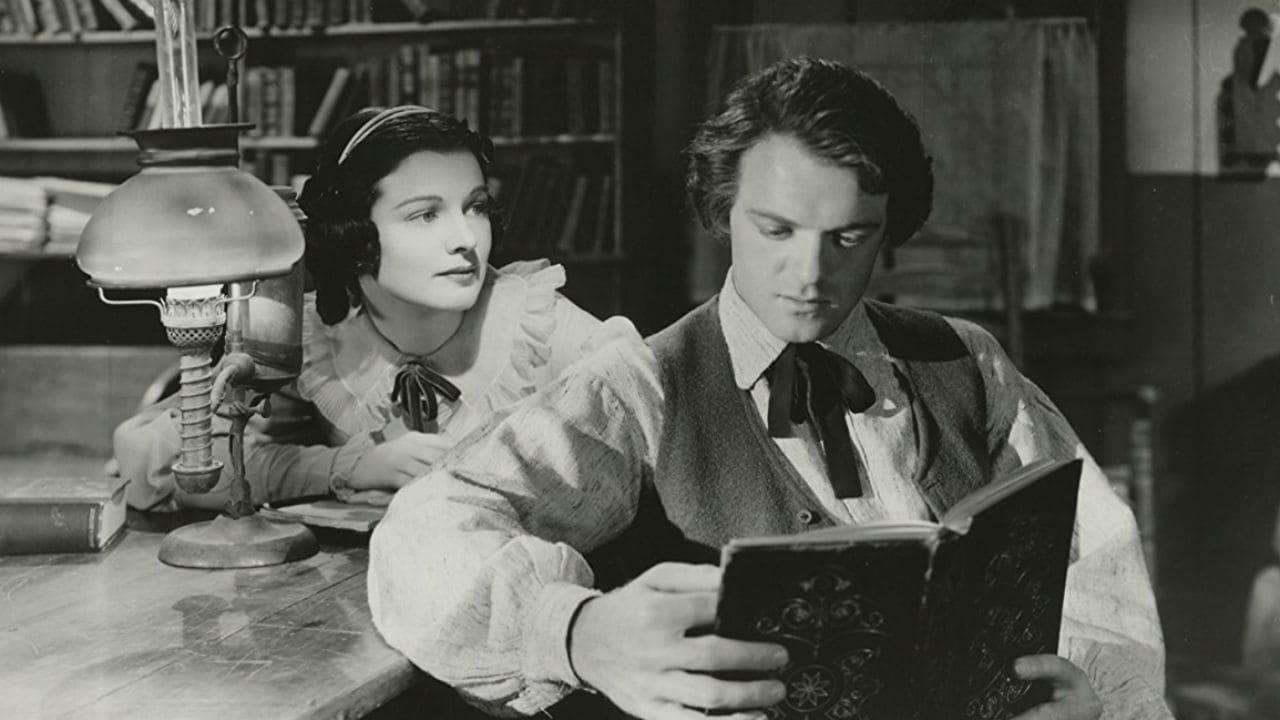

good back-story, and good acting
... View MoreExcellent, a Must See
... View MoreAbsolutely Fantastic
... View MoreEasily the biggest piece of Right wing non sense propaganda I ever saw.
... View More"The Senate of the United States, in 1868, sat as a High Court in judgment upon Andrew Johnson, who succeeded Abraham Lincoln as President. In the only great State trial in our history, President Johnson was charged with violation of a law which forbade him to dismiss a member of his Cabinet. In 1926, the Supreme Court pronounced this law unconstitutional - as Johnson had contended it was. The form of our medium compels certain dramatic liberties, but the principal facts of Johnson's own life are based on history. In the Spring of 1830 - in a Tennessee valley - our story begins," states the disclaiming prologue...There, we meet film subject Van Heflin (as Andrew "Andy" Johnson), in a leg iron. The future President is a runaway apprentice (between free-man and slave, but significantly closer to free). Bound to a tailor, Mr. Heflin has learned the profession and goes about mending figurative fences with local townsfolk. He learns to read and write from attractive Ruth Hussey (as Eliza McCardle), who becomes Heflin's first lady. Reading "The Bill of Rights" gets Heflin interested in expanding US Constitutional rights to include non-property owning "white trash" like himself...Becoming successful in politics, Heflin's Johnson goes against the Southern grain by supporting some of Abraham Lincoln's platform; they both want to keep the Union whole. After the Civil War, President Lincoln selects Johnson as his Vice-President to help heal war wounds and assist in Reconstruction. Johnson has problems after succession to the top office. Yes, there are "dramatic liberties" (lies, even) taken, as the opening states. Heflin is fine, and makes Johnson a sympathetic character. Lionel Barrymore (as Thaddeus "Tadd" Stevens) and popular "silent" film star William Farnum (as Senator Huyler) have pivotal roles.****** Tennessee Johnson (12/42) William Dieterle ~ Van Heflin, Lionel Barrymore, Ruth Hussey, William Farnum
... View MoreThough Tennessee Johnson boasts fine performances by Van Heflin, Ruth Hussey, and Lionel Barrymore as Andrew Johnson, Eliza McCardle Johnson, and Thaddeus Stevens respectively, the wrong story about Johnson was told here.The accepted historical view of Andrew Johnson's presidency now is that had he been a bit more of a politician and also had been able to rise above the prejudices of his poor white class, the whole impeachment would never have happened. His actions through the use of the presidential veto in stalling the Reconstruction set racial equality in the USA aside for a century. Men of good will on both sides had they been willing to give a little might have settled on a compromise Reconstruction policy without all the rancor that characterized it and U.S. politics for decades.The real story is Andy Johnson's rise to the presidency. As is showed here young Johnson arrives in Tennessee escaping a kind of slavery of his own. He was an indentured servant to a tailor and learned the trade, but after differences with his employer in his native North Carolina, Johnson escapes to Tennessee.Andrew Johnson is the only United States president who never spent one day inside a school classroom. He was taught to read and write by the woman who later became Mrs. Johnson. There's was a real love story, one of the most romantic in our history.Johnson's real moment of courage was after a slow rise up the political ladder that saw him elected as Mayor of Greenville, Tennessee, the state legislature, the House of Representatives, governor and then senator from Tennessee. In 1861 he was the only southern Senator to not walk out of the Senate when the south seceded. He became military governor of Tennessee when the Union Army captured enough of it to set up a government. Johnson's very life was in peril every minute from the firing on Fort Sumter to Lee's surrender at Appomattox. That's a story worth telling.Unfortunately Johnson represented the poor white class in Tennessee and saw freed slaves as a rival labor force. He had all the prejudices of his class and wasn't hesitant to voice them. That part of the story is not told in Tennessee Johnson.I did like Charles Dingle's performance as Senator Waters, why he wasn't given his real name in history of that of Ben Wade of Ohio is beyond me. As President Pro Tempore of the Senate with no sitting Vice President, he was first in line of succession had Johnson been impeached. From what I know of Ben Wade, Dingle fitted the role well.Though it made good cinema, Andrew Johnson never addressed the Senate personally during his impeachment trial. There was an ill Senator who cast a deciding vote that saved Johnson's presidency. But unlike William Farnum's character of Senator Valley, James Grimes of Iowa had been felled by a stroke and no one expected him to be in the Senate that day. But he was carried in and voted not guilty.The real story of Andrew Johnson is one of the most dramatic about one who turned out to be one of our worst presidents. Too bad it wasn't told in Tennessee Johnson.
... View MoreUnfortunately, I almost didn't make it through the first thirty minutes set in Tennessee, complete with a Marjorie Main variation of her "Ma Kettle" schtick. The town of Greeneville actually has some beautiful colonial architecture, is NOT near Nashville, and was not a backwoods mud pit in the mid-1800s - it is the second oldest town in the state, and was the capital of the former State of Franklin. (Johnson's home and tailor shop are standing today, as museums, and part of the National Park Service. A web site provides a history, and photos.) 30s/40s Hollywood would always "whitewash" history, except apparently, when it came to small towns in the South....then they'd falsely exaggerate the yahoo image for "atmosphere."The final impeachment proceeding scenario is indeed rousing, but loses it's punch when one knows it is a fabrication. I usually prefer my history lessons to come from books or documentaries, although the latter can obviously be as biased as a narrative film."Senator" Johnson's final scene in the film occurred a mere six months before his death in East Tennessee. (Interestingly, the guest home in Carter County where he took ill, later became part of a roadside tourist trap in the 50s, but has recently been sold for relocation, and one hopes, restoration.)Regardless, Heflin is great, as is the always reliable Barrymore. Worth a viewing, IF you learn the actual facts beforehand.
... View MoreWhen I showed this movie to a Civil War specialist, he said it was almost comedic because of the many historical errors. For example, Johnson actually stayed away from the Senate Trial. In the movie, however, he gave a wonderful speech in his own defense. Also, the Senate President Pro Tempore, next in line to be President, was Benjamin Wade. In the film, however, he was James Waters. In reality, Senator Edmond Ross, who was healthy, cast the acquitting vote. In the movie, however, a dying senator named Huyler did this."Tennessee Johnson" canonizes Andrew Johnson and demonizes Thaddeus Stevens. I prefer a more nuanced interpretation of history, for I find good and bad in both men. Ambiguity was not the order of the day (1943), however. Instead, the film reflects the dominant historical interpretation of the day--the Dunning Thesis.FYI, I hold a M.A. in American History.
... View More